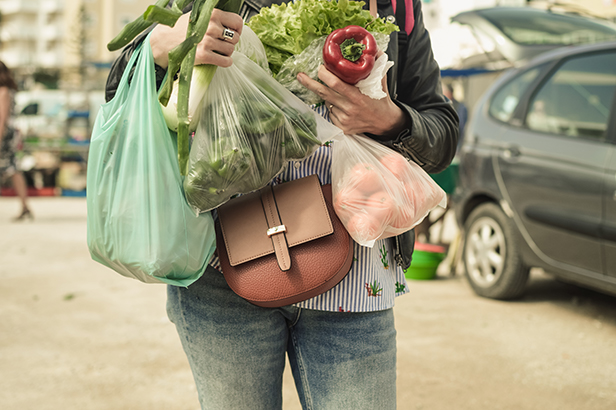Product Hub March 24, 2020
States, Cities, Grocers Rollback Bag Bans
The suspension of prohibitions on single-use plastic bags is tied to concerns about COVID-19.
Suddenly, single-use plastic bags are in again.
It’s a result of the coronavirus outbreak. In recent years, a growing number of cities and states have sought to ban single-use plastic bags and encourage consumers to use reusable bags, like totes.

However, studies have shown that unwashed reusable bags can be, as one researcher put it, “little Ubers for dangerous microorganisms.” With COVID-19 spreading rapidly in the U.S., states and cities are rolling back their single-use plastic bag prohibitions. Similarly, some grocers are telling consumers to shelve their reusables and take their groceries home in disposable plastic and paper bags.
The week of March 15, lawmakers in Maine voted to delay the implementation of the state’s planned ban on single-use plastic bags until Jan. 15, 2021. The ban had been scheduled to take effect April 22. The delay was part of Maine’s larger action plan to check COVID-19’s spread.
“These emergency measures will support the state’s response to the coronavirus and mitigate its spread in Maine,” said Maine Gov. Janet Mills.
COVID-19 Forces Maine to Suspend Plastic Bag Ban https://t.co/I2jJz8QJUA
— Chris Ruvo (@ChrisR_ASI) March 20, 2020
On the weekend of March 21 to 22, New Hampshire Gov. Chris Sununu issued an executive order mandating that grocery stores and other retailers nix reusable shopping bags and “temporarily transition to use of single-use paper or plastic bags.”
“Our grocery store workers are on the front lines of COVID-19, working around the clock to keep New Hampshire families fed,” Sununu said. “With identified community transmission, it is important that shoppers keep their reusable bags at home given the potential risk to baggers, grocers and customers.”
New York’s single-use plastic bag ban took effect on March 1. But less than three weeks after the prohibition became official, the state announced it would not be enforcing the ban until May 15. Again, fear that reusables could contribute to community spread in the state already hit hardest by the domestic coronavirus pandemic was a factor in the decision to effectively suspend the ban.
The suspension of bans is happening at the local level, too. For instance, the mayor of Kent, WA, ordered on March 20 that the city stop enforcing its single-use plastic bag ban. Meanwhile, on March 23, Duluth, MN’s City Council voted unanimously to delay enacting a 5-cent fee on plastic shopping bags from April 1 to 2021.
Supermarkets themselves are also turning away from reusable bags in favor of single-use plastic and paper bags. In a Facebook post, Pennsylvania-headquartered food retailer Weis Markets said it’s temporarily not allowing reusables.
Plastic industry groups have praised the ban reversals.
“This comes as welcome news for retailers and consumers alike as we work together through unprecedented challenges,” Matt Seaholm, executive director of the American Recyclable Plastic Bag Alliance, said in a statement. “There is ample scientific research concluding reusable bags can contribute to the spread of bacteria and viruses, and now more than ever we need to take every step possible to ensure that (people) are safe and healthy."
While proponents of plastic bag bans say they’re good for the environment, anti-bag ban advocates say that the coronavirus is compelling people to pay attention to research that’s been around for years that shows reusable bags can be detrimental to human health.
For instance, a 2012 study of San Francisco’s plastic bag ban revealed that there was a 25% increase in bacteria-related emergency room visits in the California city relative to adjacent counties that hadn’t outlawed plastic bags.
In an article for Forbes, Patrick Gleason, vice president of state affairs at the advocacy/policy research organization Americans For Tax Reform, details that a “2011 study published by researchers at the University of Arizona and Loma Linda University found that reusable shopping bags are often used for multiple purposes, transported and set down in many difference places, and are ‘seldom if ever washed.’ Researchers discovered ‘large numbers of bacteria were found in almost all bags and coliform bacteria in half,’ along with a ‘wide range of enteric bacteria, including several opportunistic pathogens.’ A number of additional studies have found reusable bags can serve as carriers of bacteria that cause food-borne illness.”
Rigorously cleaning the reusable bags after each use can kill bacteria and viruses, but reportedly only 3% of reusable bag consumers ever wash the bags.
Plastic bag bans can impact the promotional products industry. Some believe the bans can engender opportunities to sell more reusable totes. Prior to the coronavirus outbreak, distributors in New York said the ban there would create ample chances for sales of the reusable alternatives.
The increase in plastic bag bans in recent years has been part of an effort to reduce plastic litter and pollution, though some studies say the bans are ineffective at achieving that. Ban proponents say the bag pollution spoils natural habitat and poses a danger to wildlife, which can choke on or become caught in the disposables.

Product Hub
Find the latest in quality products, must-know trends and fresh ideas for upcoming end-buyer campaigns.
